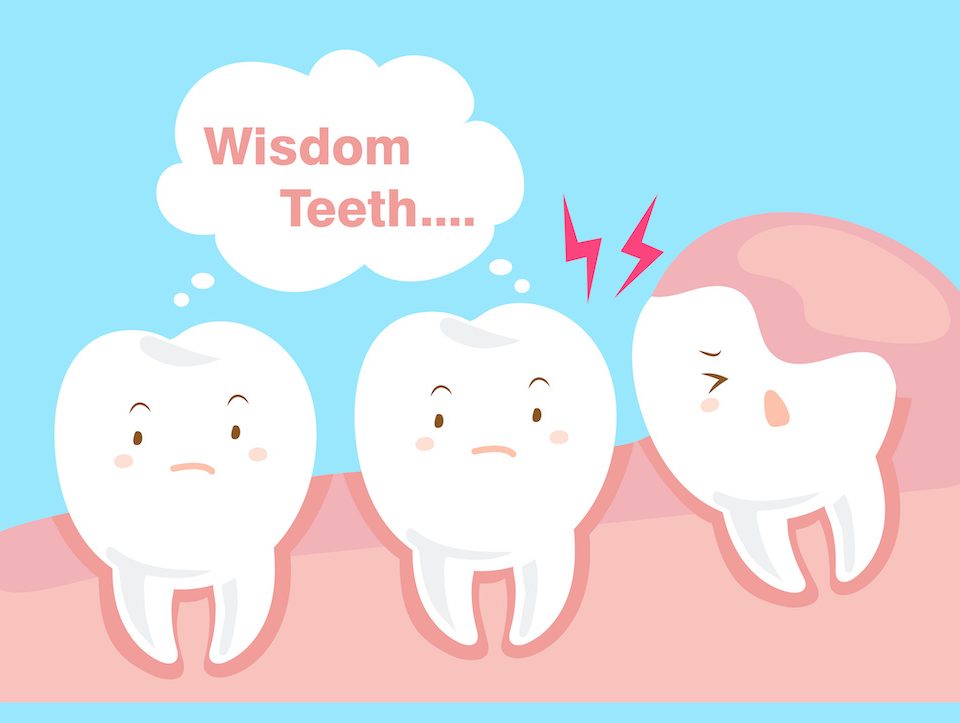Wisdom Teeth: Know Your Options
What Is The Difference Between A Dental Hygienist and A Dental Assistant?
January 27, 2018What to Do About Receding Gums
February 3, 2018Wisdom Teeth: Know Your Options
Are your wisdom teeth causing you pain or discomfort? Do you have questions about when you should have them removed? Maybe you have heard that they don’t always have to be removed? Get the facts up front so you know what to do when you are faced with these questions. Mountain Aire Dentistry is committed to educating you on all your options and working with you to keep you healthy and your smile bright!
Wisdom Teeth: What Are They?
Technically speaking, your wisdom teeth are your third molars; the rearmost teeth on each side of your top and bottom jaws. They typically arrive around somewhere between the ages of 17-21. Millions of people have their wisdom teeth extracted with success every year, however, not everyone needs to have them removed. Statistically speaking, 85 percent need to so most extractions are done to prevent possible problems from occurring down the road.
Common Reasons Wisdom Teeth Are Extracted
There are various reasons why your dentist may recommend that you have your wisdom teeth removed. The most common reasons are: 1) overcrowding; 2) Pericoronitis (infection); 3) prevention of common problems; and 4) impaction. Understanding the reasons wisdom teeth are extracted can help you in your decision to have yours removed or not.
Issues with Overcrowding
The majority of patients will not have enough room for their wisdom teeth when they begin to erupt. Their late arrival disrupts the placement of your permanent teeth and can cause issues with overcrowding. Overcrowding can cause malocclusion of your bite and can disrupt the balance and appearance of your teeth.
Gum Tissue Infection (Pericoronitis)
As your wisdom teeth begin to fight their way through the gum tissue to the surface, sometimes they only partially erupt leaving areas under the gum tissue where food particles and bacteria can get trapped. This trapped food can cause swelling and a low-grade infection called Pericoronitis. Pericoronitis, and the pain associated with it, is the most common reason patients will select to have their wisdom teeth extracted.
Preventing Future Problems
Not all of the potential challenges wisdom teeth can create will happen to you, but dentists prefer to treat your mouth conservatively not allowing for those possible problems to creep in. Preventing problems from occurring is a better treatment approach especially as you age and extraction of those wisdom teeth becomes more difficult. Younger mouths not only heal more quickly than older mouths, but the roots of wisdom teeth are not fully developed yet when you are young, and the bone around the teeth is less dense making extraction less traumatic to your mouth and surrounding tissues.
Impacted Teeth
One of the most common problems with wisdom teeth is that they become impacted. An “impacted” tooth is simply doesn’t have enough room to develop normally or erupt normally. The American Association of Oral and Maxillofacial Surgeons reports about 90 percent of people have at least one impacted wisdom tooth, that lacks the space needed for it to break through the gums. Impacted teeth should be removed to reduce pain and prevent damage to neighboring teeth. It is possible that your impacted wisdom teeth may cause trigger problems, but they are often difficult to clean allowing tooth decay and gum disease to creep in.
Wisdom Teeth Removal Risks
Occasionally, dentists will advise against extracting wisdom teeth because of nerves that could be damaged near the teeth. Lower wisdom teeth can come in dangerously close to (or embedded in) the neurovascular bundle that runs along your lower jaw and affects how your tongue feels and tastes, and how your jaw and facial muscles move. Dr. Bockrath will examine your x-rays to determine nerve damage is a risk with your wisdom teeth extraction. While damage to these nerves is possible during extraction, only a small percentage result in complications. Of that small percentage, 50 percent of patients who experience nerve damage recover spontaneously after treatment.
What is the Extraction Process Like?
When you have your wisdom teeth consultation with Dr. Bockrath, he will take the time to walk you through what you can expect to happen during your treatment and answer any questions you have. Every patient experience is a little different due to the different strengths and weaknesses of tissues and bones and the placement of the teeth. Patients can expect some temporary post-operative discomfort, but pain is controlled by oral medications, ice, and rest. During the procedure, Dr. Bockrath will make sure you are sufficiently numb so you don’t experience any discomfort. Antibiotics are prescribed to ensure infection-free healing.
Call for a Free Wisdom Teeth Consultation
If you would like to learn more about your wisdom teeth options, contact Mountain Aire Dentistry in Broomfield, Colorado, for a free consultation. During your visit, we will answer any questions you may have and provide expert recommendations on treating your wisdom teeth. Dr. Bockrath is a family dentist in Broomfield, Colorado, with convenient access to the communities of Thornton, Broomfield, Northglenn and Westminster.
When you visit our Broomfield dental office, your smile is our top priority. Our Dentists invite you to experience the difference a warm and caring team can provide for you and your family. Enjoy a unique and comfortable dental experience designed to bring a healthier and happier smile back into your life. We invite you to call or visit our Broomfield dental office and discover the exceptional difference we offer to those we serve.













